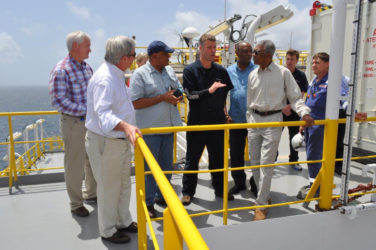There has been an undeniable air of expectancy here in Guyana arising out of the disclosure last year by the United States company, Exxon Mobil that commercial deposits of oil and gas had been offshore Guyana. Public discourse about Guyana’s oil prospects goes back several decades and if the chance that one day we might ‘strike’ oil had always remained embedded in our collective consciousness, it would also have occurred to many amongst us that, perhaps, we might have been chasing a pipe dream.
The announcement that Guyana was ‘oil country’ brought a sort of muted elation amidst a population that was still ‘taking in’ the reality of a change of political administration that had been in power for close to a quarter of a century. The years, however, had not entirely killed off the idealistic notions that had attended thoughts of a major oil find. After all, the international media had done a lot to enhance our education of the lavish life styles of the Oil Sheiks of the Middle East and of the rags to riches rise of Angola. There was Venezuela, too, our neighbor to the west, which, over time, had become the world’s fourth largest oil producer. As it happens, along with the fabulous stories of vast wealth from which the world’s major oil producers had benefitted, had also come tales of corruption in countries like Angola, Nigeria and Mexico and stories of the tyranny of the oil-rich in the dictatorships of Iraq and Libya.

Our own fanciful thoughts have persisted right up to the time of our own discovery of ‘black gold’ and the trend of public discourse still persists in the space between what is fanciful and what is realistic. Already, those who know better have had to disabuse us of the notion that the mere discovery of oil would bring about a transformative condition that might take our economy close to a condition of full employment. From another external source has come the view that projections of oil exploitation by 2020 are wildly optimistic.
Other things, probably more worthy of discourse are happening in the wake of the discovery of oil like the desirability of creating what is being called a sovereign wealth fund as a sort of assurance against frittering it all away; the training of people in a host of oil-related skills so that we can position ourselves to manage the industry efficiently; striking a balance between exploiting oil and remaining grounded in the values of an agriculture-based economy and being, in ther circumstances, far more mindful of the environmental risks associated with oil exploitation.
Then there is the vexed issue of corruption. Poor countries that come in for a sudden windfall are uniquely vulnerable and there is no reason – based on evidence at our disposal – that an oil and gas sector will not be attended by a measure of corruption. The discourse on this issue, up until now, has been muted; but sooner or later it will have to be confronted.
Government is doing the right thing by consulting with those who know and in this regard it is a good thing that we can, at this juncture, look to Trinidad & Tobago, a sister CARICOM country, to provide support. More than that we have only heard from the Ministry of Natural Resources of plans to create within the Guyana Geology & Mines Commission (GGMC) an infrastructure that will assume administrative responsibility for oil and gas matters.
More important than any of these issues, of course, is the impact that an oil economy can have on the welfare of the Guyanese people and the well-being of the country as a whole. Gold has played a critical role in holding up the economy until now but it has come with its own demons. Not least of these are environmental damage, crime, pockets of lawlessness, smuggling and corruption. Our experience of gold must surely tell us that once these negatives take root there become difficult to extricate.
What we must surely keep our eye on are those pockets of extreme poverty that persist in some oil-producing countries. In that context what we must hope for more than anything else is national leadership that is as wise as it is responsible, leadership that has an agenda that goes beyond its own aggrandizement.




